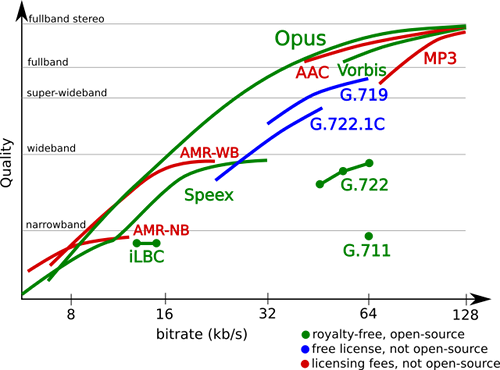IETF standardizes the Opus audio codec as RFC 6716
Opus reference implementation 1.0.1 released
Mozilla and the Xiph.Org Foundation are pleased to announce the Internet Engineering Task Force (IETF) has standardized Opus as RFC 6716. Opus is the first state-of-the-art, fully Free and Open audio codec ratified by a major standards organization.
_The_ Highly Flexible Codec
Existing audio codecs focus on a narrow set of applications, such as either voice or music in a narrow range of bitrates, real-time streaming, storage applications, and so on. This is one reason there are so many audio codecs, and nobody expects a single codec to be optimal across a wide range of uses.
That is, until now: Opus's "sweet spot" dominates nearly the entire audio-coding application space. Amongst its weaponry are such diverse elements as:
- Fearfully low latency: Frame sizes from 2.5 ms to 60 ms
- Surprising voice and music quality (it beats all other comers across its operating range, including Vorbis and AAC)
- Ruthless bitrate efficiency from 6 kb/s to 512 kb/s
- Mono and stereo support (> stereo as paired channels)
- Narrowband 8 kHz to fullband 48 kHz (enjoy high fidelity in your comfy chair)
Most importantly, Opus adapts within these operating points, altering its stream parameters in-band and seamlessly from frame to frame. Doing all of this with proprietary standards would require multiple codecs and custom code to glue them together. Opus replaces all these other codecs with better quality, greater efficiency, a small footprint, and does so out-of-the-box.
Use Cases
Opus is primarily designed for use in interactive applications on the Internet, including voice over IP (VoIP), teleconferencing, in-game chatting, and live, distributed music performances. The IETF recently announced "strong consensus" to adopt Opus as a mandatory-to-implement (MTI) codec for WebRTC, an upcoming standard for real-time communication on the web. Despite its low latency, Opus also excels at streaming and storage applications, beating existing high-delay codecs like Vorbis and HE-AAC. It's great for internet radio, adaptive streaming, game sound effects, and much more.
Although the RFC announcement may be only a day old, Opus is already supported in applications such as Firefox, GStreamer, FFMpeg, foobar2000, K-Lite Codec Pack, BASS audio library, and lavfilters, with upcoming support in VLC, rockbox and Mumble.
Free and Open
Another reason there are so many audio codecs: silly licensing restrictions. Would you base a business on technology a competitor controls?
That's why the Opus specification and complete source are Free, Open, and available for any use whatsoever without IP restrictions, explicit licensing or royalties.
Opus was developed and tested in a public, fully transparent process within the IETF, proof that open collaboration can produce a better audio codec than proprietary, secretive, patent-encumbered systems. Open standards benefit-- and benefit from-- open source organizations and traditional commercial software companies alike. Opus itself is the result of a collaboration including Broadcom, Google, the IETF, Microsoft (through Skype), Mozilla, Octasic and Xiph.Org.
Do Want!
The Opus specification is available in RFC 6716, which includes the reference implementation. Ongoing, up-to-date software releases are also available. Both links include the full high-quality encoder used in listening tests. We will continue to improve Opus's efficiency, quality, and performance as Free and Open source. For more information about Opus in general, visit the Opus website. Stay tuned, as we are now working on doing the same thing for video.
Happy Hacking!
Jean-Marc Valin, Mozilla
Monty Montgomery, Xiph.Org
Mozilla is a proudly non-profit organization dedicated to keeping the power of the Web in people’s hands. We’re a global community of users, contributors and developers working to innovate on your behalf. When you use Firefox, or any Mozilla product, you become a part of that community, helping us build a brighter future for the Web.
The Xiph.Org Foundation is a not-for-profit corporation dedicated to open, unencumbered multimedia technology. Xiph's formats and software level the playing field for digital media so that all producers and artists can distribute their work for minimal cost, without restriction, regardless of affiliation. May contain traces of nuts.

